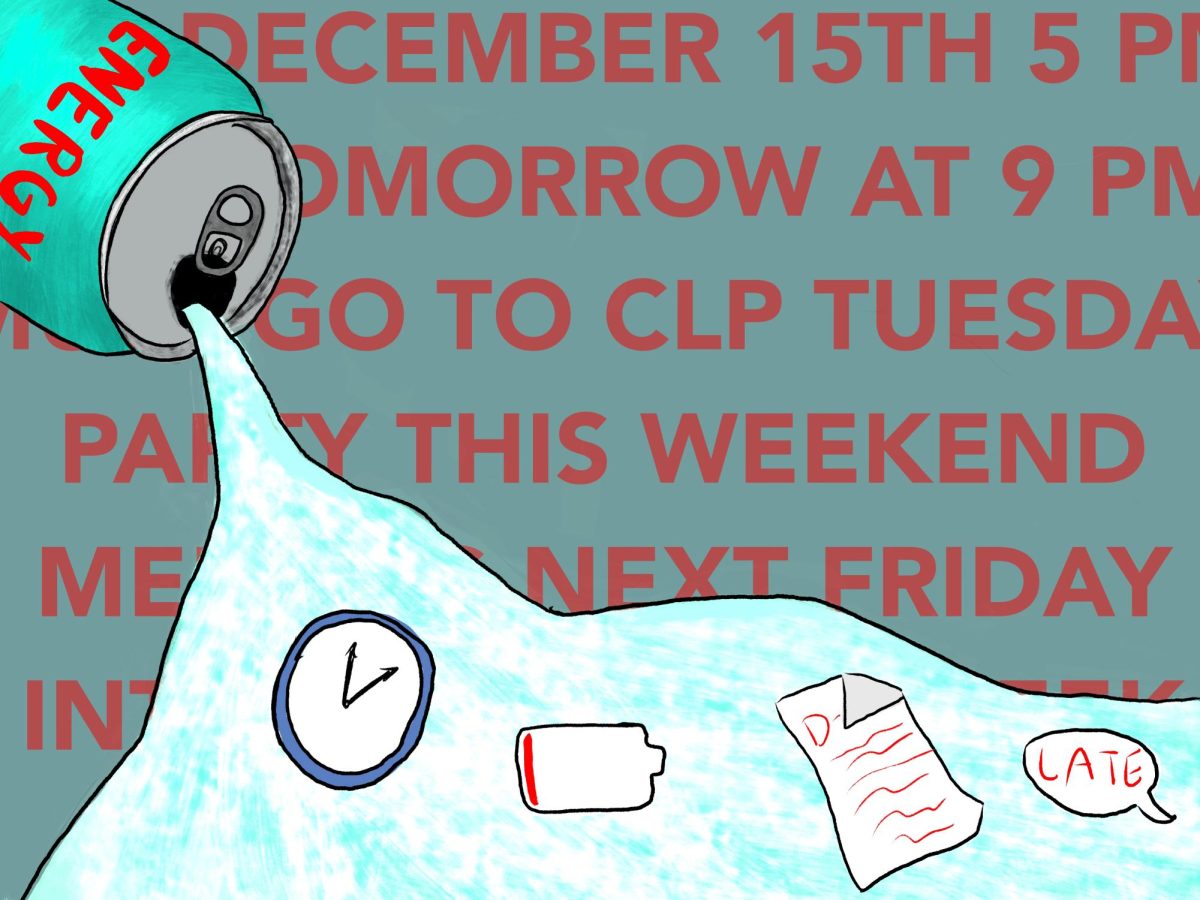Situated next to the counter in the Library Cafe is a fridge filled with what’s quickly becoming the standard of caffeine addiction: Celsius, an energy drink marketed towards developing a more active lifestyle. These cans are clearly marketed to Gen Z, using flavor titles such as “Astrovibe” and vibrant colors. The Library Cafe and P-Den both carry these caffeinated monstrosities and are even cheaper than a coffee at the Library Cafe.
What initially drove me to experiment with energy drinks was not the taste but the caffeine content, as it is much higher than a cup of coffee. I had woken up tired one day, knowing I had five classes and many assignments to get to. So, I cracked open a Celsius and have been drinking 4-5 a week ever since. This habit was originally confined to Wednesdays, then Monday-Wednesday-Fridays, and then expanded to every weekday.
Many people are aware of the massive caffeine content of energy drinks but not the additives. A Celsius contains an extraordinarily high 200mg of caffeine per can, which is more than twice a cup of coffee, as well as other stimulants like taurine, ginseng and guarana. These ingredients are used to stimulate cognitive functions and alertness, but if used in high amounts, they can cause irritability, insomnia and skin rashes. With how much sugar is in these, it is astonishing how bad these drinks still taste.
Regular energy drink use is linked to just about any health problem you can think of, including increased likelihood of alcohol use, substance abuse, violent behavior, obesity, lower academic performance, poor mental health and heart palpitations.
Many European countries, like Poland and Turkey, are implementing energy drink bans for youth due to these associated risks.
Despite their side effects, energy drinks are a successful industry. For instance, Red Bull had 7.34 billion dollars of sales in 2023, and the entire industry is expected to be worth 108.4 billion by 2031.
If energy drinks are so harmful, why do we still drink them?
Typically, people start drinking them regularly due to social and peer influence, performance enhancement abilities, or the ease of access and price, according to Health News Hub. Additionally, gender seems to be influential, as boys are more likely to use energy drinks than girls.
Marketing might be the most powerful motivating factor. They’re marketed as being a cheaper, more caffeinated alternative to coffee. However, the prices are essentially the same, and the extra caffeine is not worth the massive taste dropoff. These drinks are also marketed as an edgy, cool alternative to the bland, millennial, white-collar drink of coffee.
What is concerning is the way regular energy drink use affects the young, overtired populations to whom the drinks are marketed. Rates of depression are significantly higher among children and adults under 25 than other age groups, and tiredness is a common symptom of depression. These factors make depressed populations especially vulnerable to energy drink marketing and overconsumption.
Multiple studies have shown that energy drinks, and high caffeine intake in general, hinder antidepressant efficacy. The drink causes an addictive cycle of use where one is increasingly sleep deprived and less affected over time by the antidepressant they were prescribed. This cycle has been demonstrated in multiple studies which found that frequent energy drink consumption is linked to increases in depressive symptoms and suicide attempts.
I had to stop drinking energy drinks as I felt a sense of depression and lethargy when not drinking one. I had become reliant within just a few weeks. This reliance was eye-opening and stood as an example of my willingness to sacrifice my health for productivity and social standing.
If caffeine equals productivity, then I see why everyone is seeking this remedy. It mediates the mental effort of “locking in” and heightens one’s mood to a point where work will be achieved. However, considering the negative effects, this toxic drink is ultimately a frightening sign of a performance-based busy culture.
You can achieve great things without nursing a massive caffeine addiction. Sleeping well, eating effectively and exercising regularly all increase the amount of energy you wake up with and improve mental and physical health. There are also a myriad of healthy alternatives to energy drinks, such as coffee, tea, kombucha and sports drinks. Please take care of yourself mentally, and don’t turn to excessive caffeine intake as the anchor to your overcommitment or performance anxiety. It’s not worth it, I promise.




































